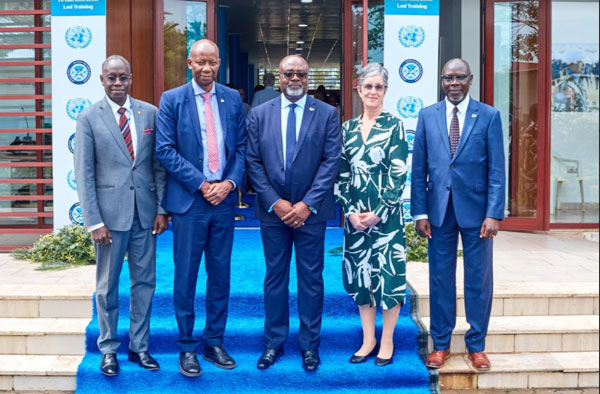
Entebbe, Uganda | PATRICIA AKANKWATSA | The United Nations Command, Control, Communication and Computers, Intelligence, Surveillance and Reconnaissance (C4ISR) Academy for Peace Operations on November 29th, unveiled its inaugural virtual instructor-led training (VILT) facility at the regional service centre in Entebbe.
VILT, a remote training class led by a facilitator through a virtual platform, represents a modern approach to training, according to Paulin Djomo, the director of the UN Regional Service Centre in Entebbe. This centre caters to over 16,000 staff members in peacekeeping and political offices across Africa.
Djomo emphasized that VILT creates a synchronous remote learning environment, enabling participants to collaborate and learn together in real time. He highlighted the significance of this new system in enhancing the UN’s capacity for mounting and sustaining peacekeeping operations and improving operational performance, safety, and security for peacekeepers.
Bernardo Mariano, the Assistant Secretary-General and Chief Information and Technology Officer underscored the critical importance of training and capacity building for successful peacekeeping missions. He stressed the need to provide the peacekeeping workforce with digital skills, emphasizing collaboration with key partners to deliver advanced training programs.
The newly commissioned VILT facility offers real-time collaboration, accessibility to subject matter experts, immersive learning experiences, tracking and measurement of success, cost reduction, and increased training capacity. It serves as a training hub for all UN peace operations and missions in Africa.
Sherri Aker, the Deputy Dean of NATO in charge of information and communication, commended the importance and relevance of the facility. She highlighted its role in success tracking, cost reduction, and providing access to subject matter experts. Aker praised the efforts of the regional support centre and the UN ISR Academy, emphasizing technology’s key role in the UN’s strategy for digital transformation and peacekeeping implementation.
Ambassador Philip Odida, the Acting Director for Regional and International Political Affairs in Uganda’s Ministry of Foreign Affairs, acknowledged the evolution of the regional support centre, emphasizing the need for a long-term commitment to the initiative. He stressed the importance of building internal capacities, promoting self-sufficiency, and aligning with the UN’s broader strategies for digital transformation and peacekeeping.
The UNCAP-NATO Partnership, endorsed by NATO Foreign Ministers in April 2020, aligns with the broader DCB Package for UN Peacekeeping Training. It aims to enhance the operational performance and safety of UN peacekeepers through sharing course materials, delivering train-the-trainer courses, providing consultancy support, and developing VILT capabilities.
The VILT centre, a cornerstone of this collaboration, introduces a remote training platform that enables real-time interaction between instructors and participants. It offers an immersive learning experience, access to expert advice, interactive simulations for skills development, and effective progress tracking. The centre also addresses challenges posed by the ongoing uncertaintCOVID-19ounding Covid-19, ensuring uninterrupted training while prioritizing safety.
The completion and launch of the VILT facility mark a significant milestone in strengthening the UN’s capacity to mount and sustain peacekeeping operations. It represents a significant step in the cooperation between NATO and the UN in implementing the Defence and Related Security Capacity Building (DCB) package for UN peacekeeping capacity development.
 The Independent Uganda: You get the Truth we Pay the Price
The Independent Uganda: You get the Truth we Pay the Price



